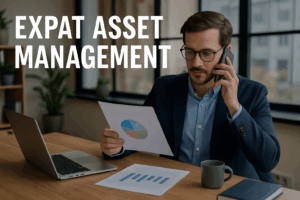Expat asset management plays a critical role in helping expatriates and high-net-worth individuals preserve, grow, and optimize their wealth across borders.
Managing assets as an expat involves unique challenges, from navigating tax regulations in multiple jurisdictions to balancing global investment risks.
Whether you own international real estate, financial portfolios, or alternative assets, having a tailored strategy is key to achieving long-term financial goals.
If you are looking to invest as an expat or high-net-worth individual, which is what I specialize in, you can email me (hello@adamfayed.com) or WhatsApp (+44-7393-450-837).
This includes if you are looking for a second opinion or alternative investments.
Some facts might change from the time of writing. Nothing written here is financial, legal, tax, or any kind of individual advice or a solicitation to invest.
In this post, we’ll explore the essentials of expat asset management, including how it differs from traditional approaches, best certification for asset management professionals, and strategies to help expats build a resilient, profitable global portfolio.

What Is Expat Asset Management and Why Does It Matter?

Expat asset management refers to the professional oversight and strategic management of an expatriate’s global assets, including investments, real estate, financial accounts, and alternative holdings across different jurisdictions.
For expats and high-net-worth individuals, managing assets internationally involves more complexity than domestic asset management.
Asset management is a role that allows the owner of the assets to step back from the day-to-day decisions of evaluating risks versus opportunities, delegating these responsibilities to professionals who actively monitor and optimize the portfolio.
A well-structured asset management plan helps protect wealth from unnecessary taxation and supports long-term financial goals like retirement, inheritance, and lifestyle maintenance.
Assets Under Management Example
While many people associate expat asset management with stocks and bonds, it spans a wide range of asset classes.
The types of assets typically managed include:
- Financial assets: Stocks, bonds, mutual funds, ETFs, money market instruments, and other securities held across international markets.
- Real estate assets: Residential and commercial properties, rental investments, vacation homes, and land holdings in various countries.
- Alternative investments: Private equity, hedge funds, venture capital, commodities, art collections, and other non-traditional assets.
These assets are also classified based on convertibility, physical existence, and usage.
Each asset class requires specialized strategies to balance growth, liquidity, and tax efficiency, making professional management essential for global investors.
What is the purpose of the asset manager?
Managing assets across borders comes with unique financial, legal, and tax challenges.
An expat asset manager provides specialized expertise to help expatriates navigate these complexities while protecting and growing their global wealth.
The role of an expat asset management professional typically includes:
- Expat tax planning: Advising on strategies to minimize double taxation and fulfill tax reporting obligations in multiple jurisdictions.
- International investment compliance: Ensuring global investments comply with foreign ownership laws, securities regulations, and local rules in each country.
- Structuring asset transfers: Guiding expats on how to efficiently transfer assets across borders, including real estate, financial portfolios, and business holdings.
- Mitigating legal risks: Helping clients understand and navigate differences in inheritance laws, marital property regimes, and other legal frameworks affecting global wealth.
By working with an expat asset manager, high-net-worth individuals gain tailored strategies to manage risks, seize opportunities, and achieve their long-term financial goals while living abroad.

What Certification is Best for Asset Management Professionals Working with Expats?
For expats and high-net-worth individuals seeking professional guidance in expat asset management, choosing an advisor with the right credentials is essential.
Some of the best certifications for asset management professionals working with expats include:
- Chartered Financial Analyst (CFA): Considered the gold standard in investment management, a CFA charter-holder is highly qualified in portfolio management, asset allocation, and investment analysis. Ideal for expats seeking advisors with deep investment expertise.
- Certified Financial Planner (CFP): A CFP focuses on comprehensive financial planning, including retirement, estate planning, tax strategies, and risk management—critical for expats who need a holistic approach to managing assets across multiple countries.
- Financial Risk Manager (FRM): FRMs specialize in identifying and mitigating financial risks. For expats exposed to currency fluctuations, geopolitical risks, and market volatility, working with an FRM can add valuable risk management insight.
- Chartered Alternative Investment Analyst (CAIA): For expats and HNWIs invested in hedge funds, private equity, or real estate funds, a CAIA-certified professional brings expertise in alternative assets beyond traditional stocks and bonds.
Expats should consider working with an asset manager who holds one or more of these certifications, depending on their portfolio’s complexity and investment preferences.
Each credential reflects a different area of specialization, allowing expats to align their advisor’s expertise with their financial goals.
What is the Difference Between Asset Management and Investment Management?
For expats and high-net-worth individuals managing wealth internationally, it’s crucial to understand the difference between asset management and investment management, as both serve distinct yet complementary roles in building and protecting global wealth.
- Asset management takes a holistic approach, overseeing the entire portfolio of assets—including financial investments, real estate, alternative assets, and business interests. The focus is on preserving and growing wealth through diversification, tax efficiency, estate planning, and strategic allocation across multiple jurisdictions.
- Investment management, by contrast, focuses more narrowly on the selection, buying, and selling of securities like stocks, bonds, mutual funds, and ETFs. It’s primarily concerned with achieving returns within the financial markets, based on a specific investment strategy or mandate.
While investment managers are tasked with making market-driven decisions within a portfolio, asset managers take a bigger-picture view, ensuring those investment decisions align with the expat’s broader financial goals, tax obligations, and cross-border considerations.
- Work with an asset manager to coordinate all aspects of global wealth, including real estate, financial investments, tax strategies, and estate planning.
- Engage an investment manager for specialized expertise in market investments and securities trading.
- Ensure both professionals collaborate so that investment performance integrates with the expat’s overall financial plan.
Understanding the difference empowers expats to delegate responsibilities wisely while maintaining a cohesive and tax-efficient global wealth strategy.
What Is Asset Management in Real Estate?
For expat property owners, understanding expat asset management in real estate is crucial for maximizing the value and profitability of their international properties.
Real estate asset management refers to the strategic oversight of real estate investments to increase their long-term value and returns, not just the day-to-day operations.
Unlike property management, which focuses on tasks like tenant relations, maintenance, and rent collection, real estate asset management takes a higher-level approach.
It involves making decisions about:
- When to buy or sell a property
- How to finance acquisitions or improvements
- Ways to reposition properties to achieve better income or capital appreciation
- Evaluating market trends across different countries or regions
Key differences between asset management and property management for expats:
- Property management = managing the building’s operations (tenants, repairs, leases)
- Asset management = managing the financial performance and investment strategy of the property
For expats and high-net-worth individuals owning property abroad, real estate asset management ensures that each property aligns with their broader wealth goals, while navigating the complexities of local real estate laws, taxes, and market conditions.
By hiring a professional asset manager or working with an asset management company, expats can gain expert insights into how to optimize property portfolios, reduce risks, and improve returns on international real estate investments.

Risk and Profit: Which Asset Is Riskiest and Which Is the Most Profitable?
When building a global portfolio, expats and high-net-worth individuals must weigh the riskiest assets against those with the highest profit potential.
Which asset is riskiest of all?
Among mainstream investments, cryptocurrencies are often considered the riskiest asset class due to extreme volatility, lack of regulation in some jurisdictions, and rapidly shifting market sentiment.
Other high-risk assets include:
- Venture capital investments in early stage startups
- Emerging market equities in politically or economically unstable regions
- Leveraged investments or highly speculative derivatives
What is the most profitable asset in the world?
Historically, some of the most profitable assets have been:
- Stocks
- Private equity
- Luxury real estate in prime global cities like London, New York, and Singapore
However, profitability depends on time horizon, market cycles, and investor risk appetite.
Implications for expats balancing risk vs reward:
For expats managing wealth across countries, choosing between high-risk/high-reward investments and more stable assets requires careful consideration of:
- Tax treatment in home and host countries
- Currency risks
- Estate planning implications for cross-border assets
- Access to local vs international investment opportunities
A diversified portfolio tailored to an expat’s residency status, tax obligations, and long-term goals can help balance these risks and rewards.
Working with an experienced expat asset manager or financial advisor can further ensure global compliance while pursuing profitability.
Conclusion: Building a Strong Expat Asset Management Strategy
A tailored expat asset management plan ensures your portfolio works for you, whether that means funding your lifestyle abroad, preserving wealth for the next generation, or optimizing tax outcomes worldwide.
Working with professionals who understand the unique challenges of expat life can make all the difference in achieving long-term financial success.
Pained by financial indecision?

Adam is an internationally recognised author on financial matters with over 830million answer views on Quora, a widely sold book on Amazon, and a contributor on Forbes.



